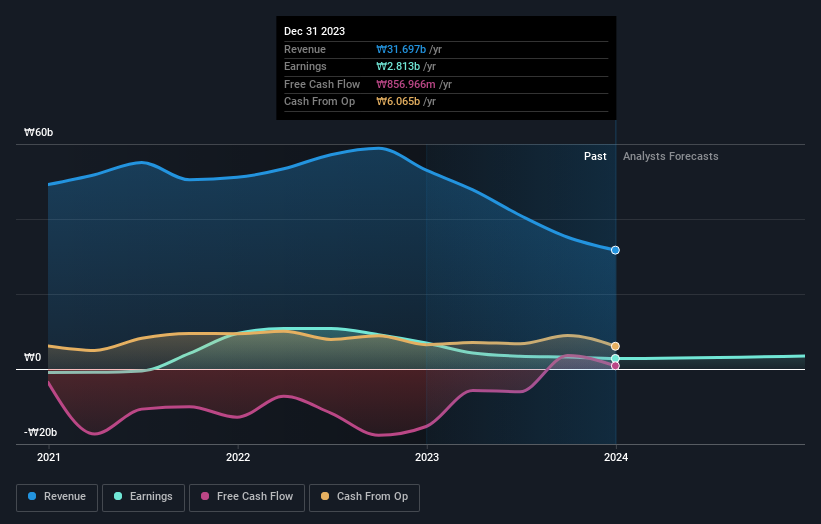Stock Analysis
- South Korea
- /
- Consumer Durables
- /
- KOSDAQ:A270660
EVERYBOT Inc. (KOSDAQ:270660) surges 14%; individual investors who own 51% shares profited along with insiders

Key Insights
- EVERYBOT's significant individual investors ownership suggests that the key decisions are influenced by shareholders from the larger public
- A total of 6 investors have a majority stake in the company with 49% ownership
- 42% of EVERYBOT is held by insiders
A look at the shareholders of EVERYBOT Inc. (KOSDAQ:270660) can tell us which group is most powerful. We can see that individual investors own the lion's share in the company with 51% ownership. That is, the group stands to benefit the most if the stock rises (or lose the most if there is a downturn).
Individual investors gained the most after market cap touched ₩303b last week, while insiders who own 42% also benefitted.
Let's delve deeper into each type of owner of EVERYBOT, beginning with the chart below.
Check out our latest analysis for EVERYBOT

What Does The Lack Of Institutional Ownership Tell Us About EVERYBOT?
We don't tend to see institutional investors holding stock of companies that are very risky, thinly traded, or very small. Though we do sometimes see large companies without institutions on the register, it's not particularly common.
There could be various reasons why no institutions own shares in a company. Typically, small, newly listed companies don't attract much attention from fund managers, because it would not be possible for large fund managers to build a meaningful position in the company. On the other hand, it's always possible that professional investors are avoiding a company because they don't think it's the best place for their money. Institutional investors may not find the historic growth of the business impressive, or there might be other factors at play. You can see the past revenue performance of EVERYBOT, for yourself, below.

We note that hedge funds don't have a meaningful investment in EVERYBOT. The company's CEO Woo-Cheol Jung is the largest shareholder with 35% of shares outstanding. Smart & Growth Co., Ltd. is the second largest shareholder owning 7.2% of common stock, and In-u Hyeong holds about 6.5% of the company stock.
On studying our ownership data, we found that 6 of the top shareholders collectively own less than 50% of the share register, implying that no single individual has a majority interest.
While it makes sense to study institutional ownership data for a company, it also makes sense to study analyst sentiments to know which way the wind is blowing. As far as we can tell there isn't analyst coverage of the company, so it is probably flying under the radar.
Insider Ownership Of EVERYBOT
The definition of company insiders can be subjective and does vary between jurisdictions. Our data reflects individual insiders, capturing board members at the very least. Management ultimately answers to the board. However, it is not uncommon for managers to be executive board members, especially if they are a founder or the CEO.
I generally consider insider ownership to be a good thing. However, on some occasions it makes it more difficult for other shareholders to hold the board accountable for decisions.
Our most recent data indicates that insiders own a reasonable proportion of EVERYBOT Inc.. Insiders own ₩127b worth of shares in the ₩303b company. This may suggest that the founders still own a lot of shares. You can click here to see if they have been buying or selling.
General Public Ownership
The general public, mostly comprising of individual investors, collectively holds 51% of EVERYBOT shares. This level of ownership gives investors from the wider public some power to sway key policy decisions such as board composition, executive compensation, and the dividend payout ratio.
Private Company Ownership
We can see that Private Companies own 7.2%, of the shares on issue. It might be worth looking deeper into this. If related parties, such as insiders, have an interest in one of these private companies, that should be disclosed in the annual report. Private companies may also have a strategic interest in the company.
Next Steps:
While it is well worth considering the different groups that own a company, there are other factors that are even more important. Take risks for example - EVERYBOT has 3 warning signs (and 2 which are a bit concerning) we think you should know about.
If you would prefer check out another company -- one with potentially superior financials -- then do not miss this free list of interesting companies, backed by strong financial data.
NB: Figures in this article are calculated using data from the last twelve months, which refer to the 12-month period ending on the last date of the month the financial statement is dated. This may not be consistent with full year annual report figures.
Valuation is complex, but we're helping make it simple.
Find out whether EVERYBOT is potentially over or undervalued by checking out our comprehensive analysis, which includes fair value estimates, risks and warnings, dividends, insider transactions and financial health.
View the Free AnalysisHave feedback on this article? Concerned about the content? Get in touch with us directly. Alternatively, email editorial-team (at) simplywallst.com.
This article by Simply Wall St is general in nature. We provide commentary based on historical data and analyst forecasts only using an unbiased methodology and our articles are not intended to be financial advice. It does not constitute a recommendation to buy or sell any stock, and does not take account of your objectives, or your financial situation. We aim to bring you long-term focused analysis driven by fundamental data. Note that our analysis may not factor in the latest price-sensitive company announcements or qualitative material. Simply Wall St has no position in any stocks mentioned.
About KOSDAQ:A270660
EVERYBOT
Everybot Inc. operates as a home service robot company worldwide.
Excellent balance sheet with poor track record.


